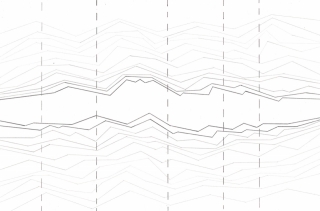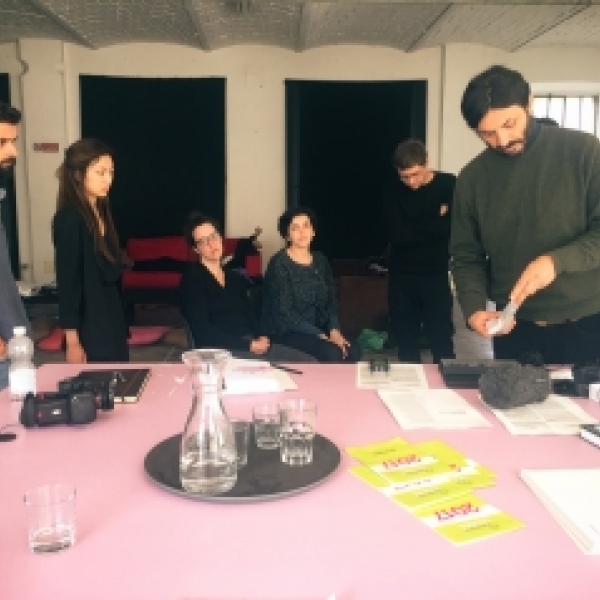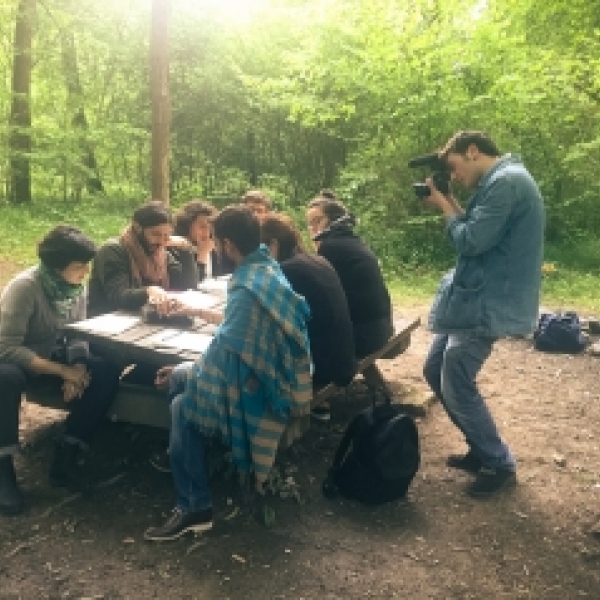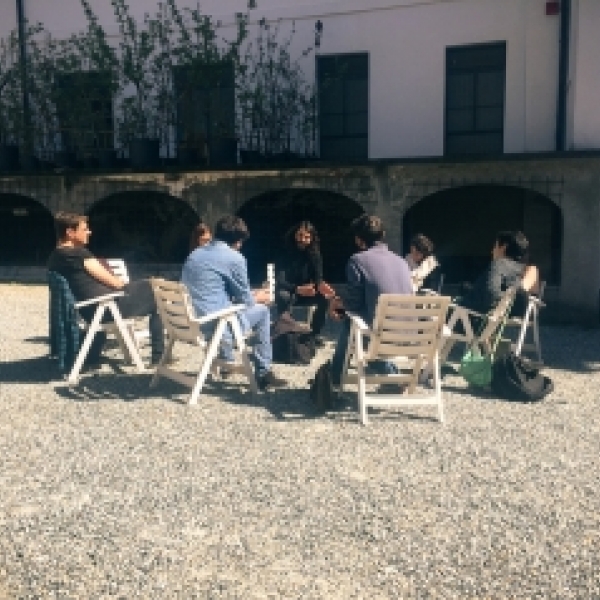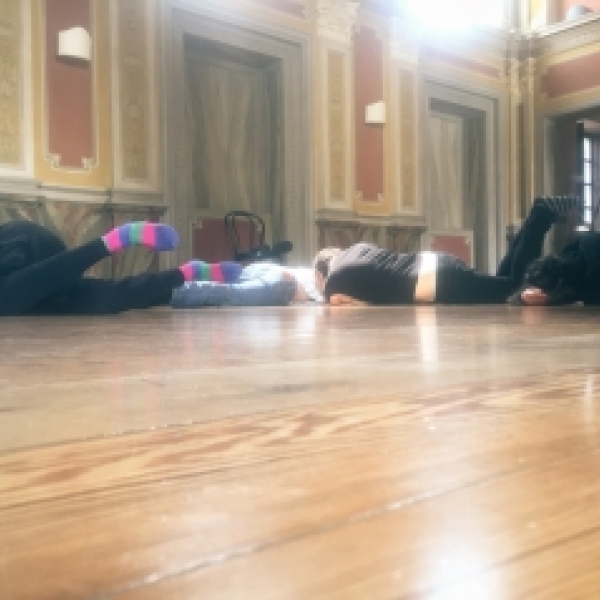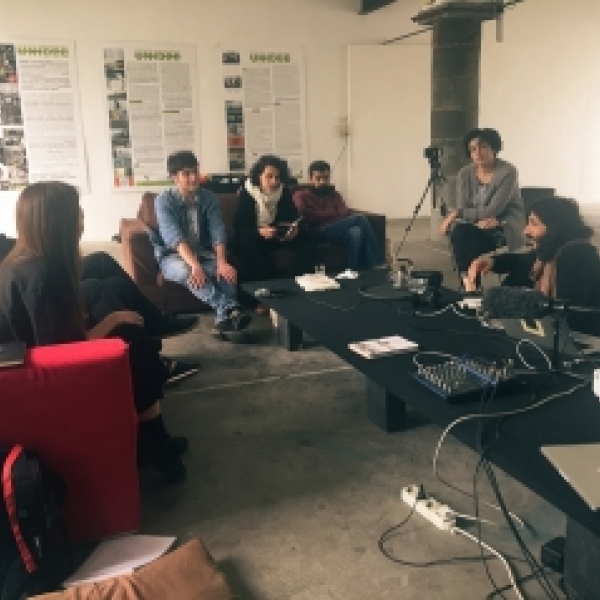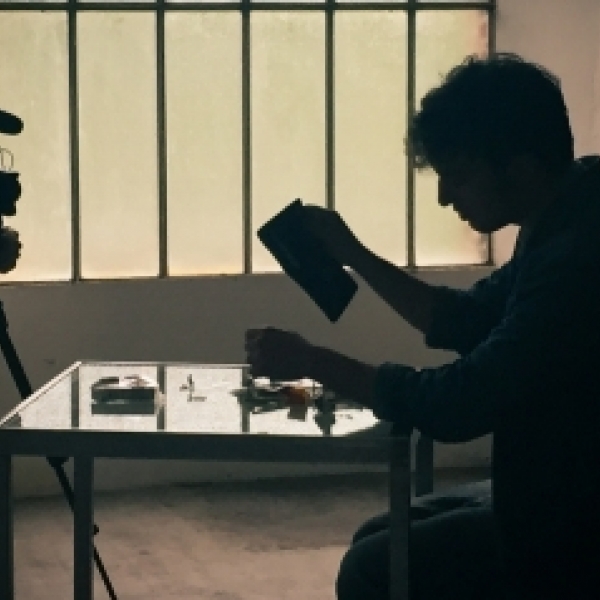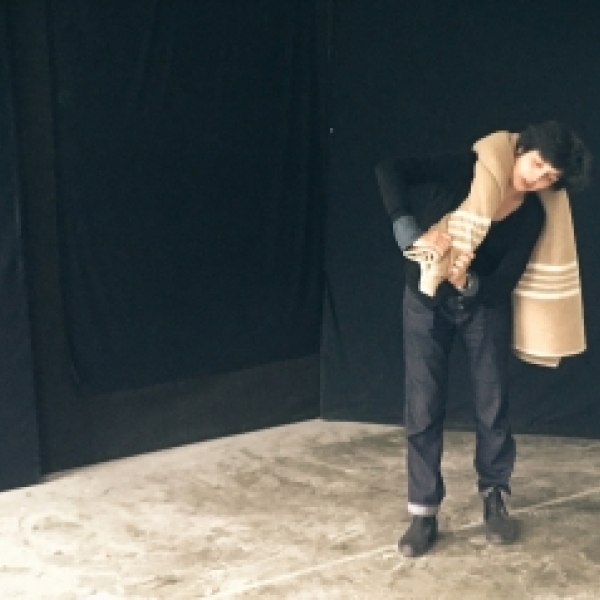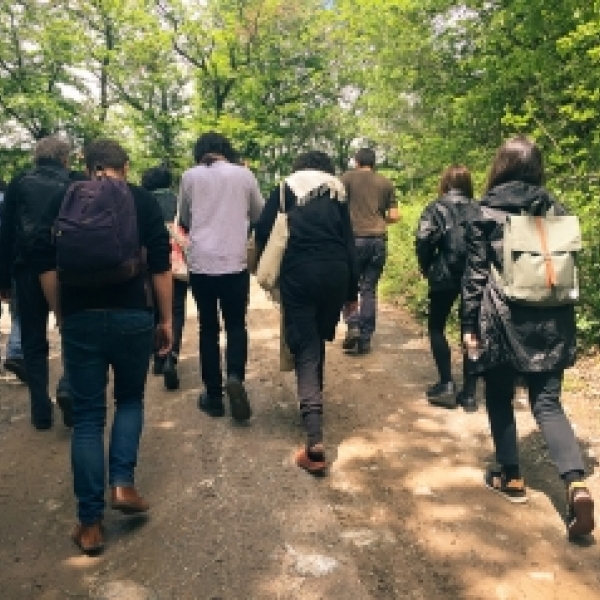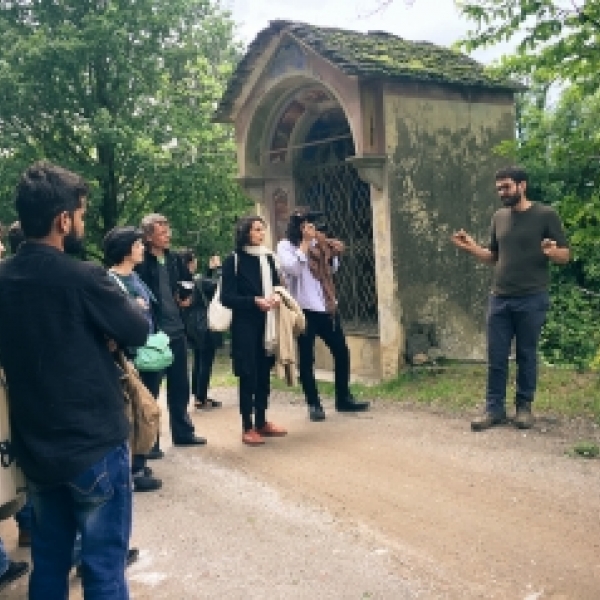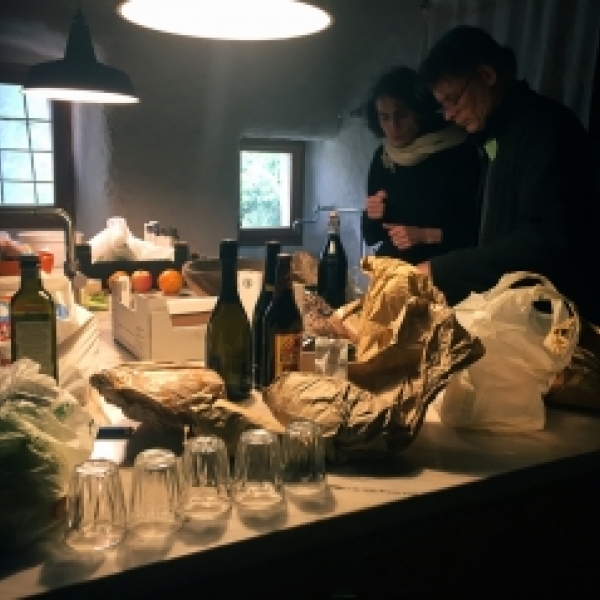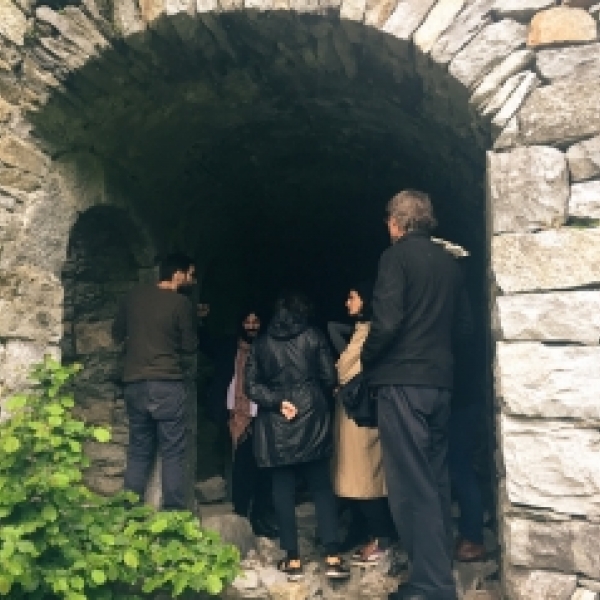Proposal for Schizoanalytical Seminar II: Title Forthcoming
Introduction:
The schizo-analytic module turns the context of the week-long seminar at Cittadellarte into the set of a historical film being made in 2057, about a seminar set in the year 2017.
The participants of the module, together with the mentors, will enact a seminar while documenting it as a film. Thus participants engage the seminar in a double role, playing actors playing the part of participants, in this seminar. Similarly, the mentors will play the role of actors who play the role of mentors.
The hope is that the distancing and self-awareness of our selves, our time and the conditions of making this collective seminar / film will allow a different perception of our common condition to arise. Participants will take turns filming the seminar and performing in the film as will the mentors.
The film will be edited collectively and presented on the final day of the module.
Film Synopsis (2057):
In what some consider to be their most piercing work to date, Ayreen Anastas and Rene Gabri work with a brilliant cast of collaborators to return to a question they have been exploring for nearly 60 years of their cinematic and artistic practice: How can desire be understood as a revolutionary force? How can it evade the mechanisms of capture which stifle it and direct it toward the destruction of worlds?
Set in the small town of Biella, then still a part of Italy, the film restages a seminar that artists conducted in 2017. That seminar tried to mark the hundred years since the Revolution of 1917 in Russia by taking up the themes of Revolution, Desire, and Mediation.
The film is not a nostalgic staging of an innocence and simplicity that those times afforded, but rather a glimpse of a moment in time in which technology was playing an increasingly powerful role in the production of subjectivity, fascisms and microfascisms were on the rise, war and ecological ruin were forcing mass migrations and a relentless capitalist logic was extracting value from every corner of the planet, even mining the depths of human relations.
The film examines the process by which minor events can register and resonate strongly when measured against the grand narratives of large historical events. Although not functioning as a didactic tool, the film does elicit and stimulate a return to the thinkers and movements of the late 20th and early 21st century in reimagining the possibilities of human survival on the planet.
The film can be mesmeric or irritating: irritating if one tries to force it into fulfilling preconceived notions of plot and character, mesmeric if one trusts the film-makers to lead one into fresh areas of perception.
The cast of participants is brilliant in their ability to capture the zeitgeist of the time and to recreate a world that today seems long gone. But the film, instead of being a periodization piece, fixing a historical moment, or a desperate attempt to recall how we arrived at the state we are in, puts us right at the heart of a question which remains totally contemporary, “How do we want to live?”
Those familiar with the filmmakers’ penchant for a cinema of poor means, will be surprised to see the amount of resources which have been allocated to reproduce the most minute details of everyday life circa 2017 including the environs, food, clothing, modes of speech, gestures, furnishings, and even the technological devices of that period.
Original Seminar Synopsis (2017):
On the occasion of one hundred years since of the Revolution of 1917 in Russia – in the midst of a crisis that appears to extend from the inter-personal to the economic, political, social and ecological deterioration around us – we propose to examine the interrelation of the notions of Revolution, Desire, and Mediation.
Revolution, Desire, and Mediation, each of these three notions have played a critical role in our thinking and practice.
In the context of art, each has specific connotations, territories and histories associated with it. But they are also porous and malleable notions, which we can use to speak and think about our present.
Revolution names the different moments of social upheaval and radical change which break with or rupture from existing orders. In art, it can conjure imagery from and of those movements of break or radical transformation.
Desire is the river or the stream of feelings, gestures, ideas, sensual experiences, forces, affections that push and pull us toward and away from things, places, life forms, and processes.
Desire from this angle is the movement to a co-flow, a common understanding of being-with that is closer in this case to becoming-with of these rivers and streams with big fish, small fish, algae, grass, mud, earth, boats, dogs, cats, trees, sheds, clouds, laughter, dance, madness, tenderness, sensibility, sounds, colours.
Revolutionary processes open up new and repressed flows of desire which have stagnated under the force of systems and institutions which block or try to contain and channel them.
Mediation in the realm of art is potentially a way of understanding the circular flow in which the rivers of desire and desiring beings are transformed, rearticulated through singularities and multiplicities into a potentially new cartography and sharing of affects, gestures, ideas, sensual experiences, etc.
These processes of rearticulation, enunciation and mediation have the power to introduce ruptures in the order of the “sensible” and collective imagination. And at times, these ruptures rekindle the desire and constituent forces of revolutionary processes and struggle. They help breach the dominant systems producing and modelizing subjectivity.
These are the moments when new forms of aesthetic experience and expression, in their most expanded sense, nourish and seed the revolutionary soils and the processes of becoming.
To understand and consider how these three terms interrelate, cohabit and may also help us in struggling, living, and creating in these uncertain times – this seminar or time of thinking together will structure a kind of performative play, in which these categories are animated through one another and through experiences, films, texts, and processes which help intensify our understanding of them.
Ayreen Anastas and Rene Gabri
SCHEDULE
May 8th
morning
Guided tour to Cittadellarte (Curated by Elena Rosina), including the Pistoletto, Arte Povera collections and temporary exhibitions.
Introduction to the Theorem of Trinamics, the symbol of the Third Paradise and the concept of Demopraxy.
afternoon
Introduction to schizoanalysis and to the basic scenario of the film and the means the group will use to document, mediate, and perform this seminar for those who will take part.
———————————
Filming begins
———————————
May 9th
morning
Revolution through desire.
afternoon
Revolution through mediation.
May 10th
morning
Mediation through revolution.
afternoon
Mediation through desire.
May 11th
morning
Desire through revolution.
afternoon
Desire through mediation.
———————————
Seminar / Filming ends
———————————
May 12th
morning
Editing the film / discussion.
afternoon
Editing the film / discussion.
evening
Screening / Party.
REFERENCES
The mentors will prepare a reader for participants with key texts, some of which will be discussed during the week. The reader will include texts and films by Suely Ronik, Carla Lonzi, Felix Guattari and Gilles Deleuze, Jean Rouch & Edgar Morin, Daniele Huillet & Jean-Marie Straub, Carolee Schneemann, Jack Smith, Karl Marx, Vladimir Lenin, Hortense Spillers, Dziga Vertov Groupe, Groupe Medvedkine, Michel Foucault, Jacques Rancière, Trinh T. Minh-ha, Silvia Federici, Paolo Virno, Mosireen, Fred Moten & Stefano Harney, Abounaddara, Chiapas Media Project, Audre Lorde, Situationist International, Guy Debord, Giorgio Agamben, Mariarosa Dalla Costa, and others.
Links to texts as well as film material will be provided in advance of the seminar.
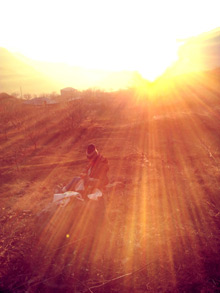
BIOGRAPHY
Ayreen Anastas and Rene Gabri are artists currently living between a megalopolis and a small mountain village.
Taking life as a form of writing, engaging, playing, experimenting, often collectively, with friends (e.g., 16 Beaver Group, e-Xplo, Centre for Parrhesia, Society for the Diffusion of Useful Knowledge, Un Groupe Comme les Autres, ...), constructing and inhabiting planes of consistency with fellow commoners (e.g., AND...AND...AND, Commoning Times, ...) and struggling to engage and confront the dominant forms of modelization of subjectivity - the two are most interested in processes which nurture a common and concurrently multiply the paths of singularization and autonomy.
Ayreen writes in fragments:
Possibly. Ayreen, Bethlehem, architecture, philosophy, literature, art, such and such biennials, this and that exhibition, x and y residency, Palestine, occupation, videos, films, Pasolini, New York, Armenia, Caucasus, Berlin, Deleuze, Mariarosa Dalla Costa, Silvia Federici, reproduction, subsistence, Venice, documenta(13), and and and…
Rene asks:
In light of the fact that struggle today is not restricted to political economy and controlling the means of production or reproduction:
How can we decolonize the capitalist production of Desire and disrupt its immaterial and material factories of production of subjectivity and subjectivation? And how can the attempt to develop these means of decolonization resist absorption, institutionalization, or becoming-sectarian?
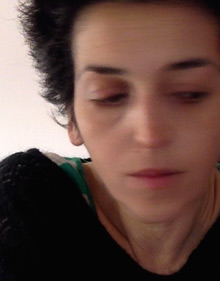
GUEST
Carla Bottiglieri Greil is a contemporary dancer/performer, researcher in body politics and aesthetics, practitioner of two somatic methods known as Body-Mind Centering and Rolfing. Somatics is in her understanding the magnifying glass for questioning and experiencing some haunting issues: embodiment/empowerment, reshaping of existential territories, non-immune lives, subjectivation and de-subjectivation. She is a passionate partner of theatrical adventures, recently next to the Ueinzz Theatre Company and Gaëlle Bourges/OS. With a group of friends, she initiated a process called “minimo comune multiplo”, aiming to imagine a place of co-living and co-caring, allowing the coexistence of different forms-of-life, cultures and geographies, trajectories and rhythms.
The residency fee includes accomodation, half-board and Arci's Annual Pass Membership.
